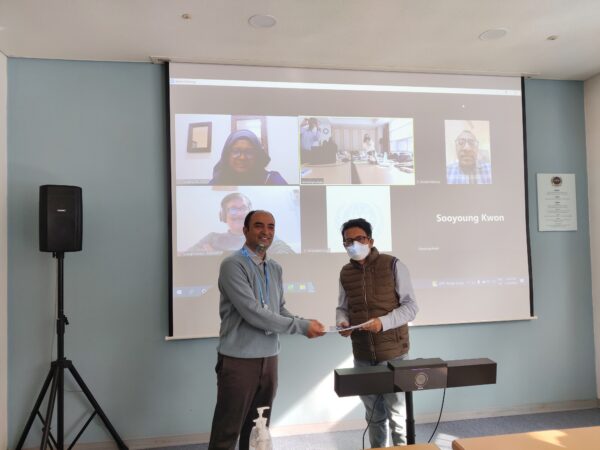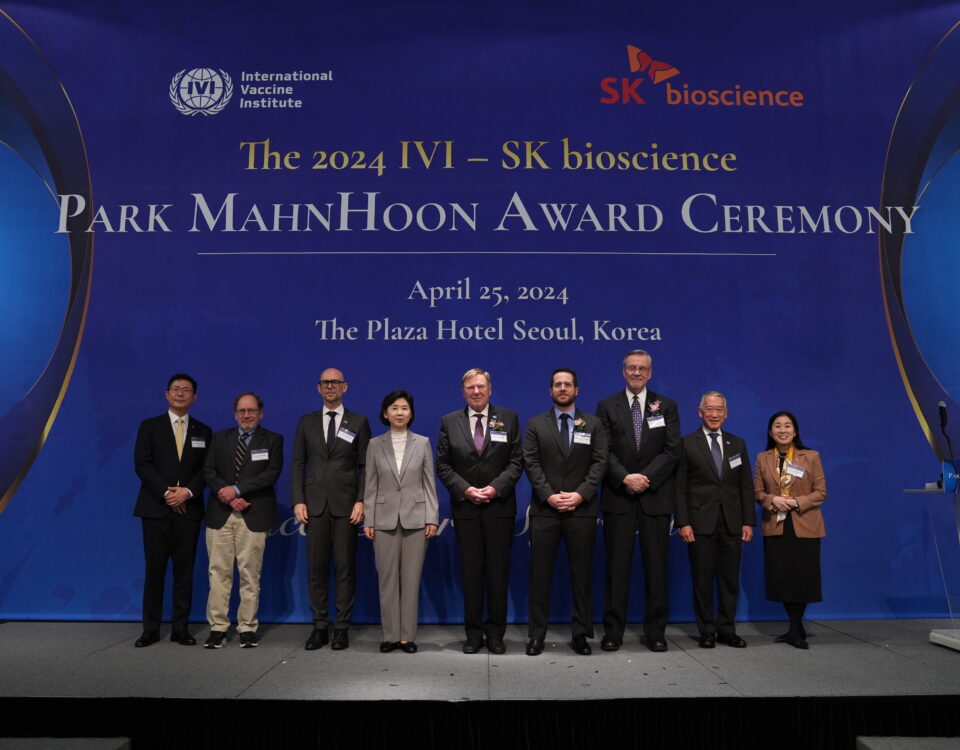- Report contains key findings for stakeholders engaging in AMR surveillance, research, policy, regulatory decision-making, and other infectious disease prevention and control programs in Bangladesh and wider Asia, supported by the Fleming Fund.

Dr. Nimesh Poudyal, Research Scientist at IVI and Project Lead of CAPTURA, hands over the country report to the Ministry of Health and Family Welfare of Bangladesh during a visit to IVI. Credit: IVI
June 20, 2023, SEOUL, Republic of Korea – CAPTURA is a Fleming Fund, UK Aid initiative, led by the International Vaccine Institute (IVI) to increase the volume of quality data on antimicrobial resistance (AMR), consumption (AMC), and use (AMU) in South and South East Asia. The project has released a final report on the engagements and activities conducted in Bangladesh as the first country to publish CAPTURA data on a government website.
The report, produced by the CAPTURA consortium including IVI, the Public Health Surveillance Group, Brigham & Women’s Hospital, and Oxford University’s Big Data Institute, recommends a heightened focus on quality AMR data generation at the country level as well as the inclusion of the private sector in national surveillance systems.
The report goes on to present a summary of findings from the scoping and analytical work, noting an additional need for standardized data collection and improved record-keeping practices across pharmacies. This will help provide information on AMU at the patient level.
The project successfully collected and analyzed retrospective AMR data between 2016 and 2020, identified and assessed laboratories’ existing microbiology capacity, and provided database software (WHONET) trainings to technical laboratory staff, building capacity in data management and analysis for future surveillance efforts.
“With the achievements and momentum from the CAPTURA project, we hope that continued collection and sharing of quality data on AMR, AMC, and AMU will help Bangladesh to strengthen its national surveillance system.
“This will implement evidence-based approaches for the containment of AMR, a critical and growing public health threat, as well as the treatment and prevention of infectious diseases affected by AMR,” said Dr. Nimesh Poudyal, Research Scientist at IVI and Project Lead of CAPTURA.
The CAPTURA surveillance report is essential for identifying data sources and establishing a preliminary baseline for targeted investment in combatting AMR in Bangladesh, where high levels of resistance to commonly used antimicrobials in the broader Asia region have been observed.
Fleming Fund Regional Grants Coordinator at Mott MacDonald, Luna Parry, added: “These findings are powerful tools that policymakers can use at the country level. Instrumental in developing a baseline on AMR/AMC/AMU data quantity and quality, the report paves the way for further healthcare improvement and sustainability. The excellent work undertaken by CAPTURA has produced outputs that will be useful at the local facility, national, and continent-scale in tackling AMR.
In partnership with the Directorate General of Health Services, Directorate General of Drug Administration, and the Ministry of Health and Family Welfare of Bangladesh, the data in this report was analyzed and collated by the CAPTURA in-country team and AMR stakeholders from the Government of Bangladesh during the National Dissemination Workshop held in May 2022 in Dhaka.
CAPTURA is supported by a Fleming Fund regional grant. The Department of Health and Social Care (DHSC)’s Fleming Fund is a UK aid program supporting up to 25 countries across Africa and Asia to tackle antimicrobial resistance (AMR), a leading contributor to deaths from infectious diseases worldwide.
The Fleming Fund invests in strengthening AMR surveillance systems through a portfolio of country grants, regional grants and fellowships managed by Mott MacDonald, and global projects managed by DHSC.
###
About the International Vaccine Institute (IVI)
The International Vaccine Institute (IVI) is a non-profit international organization established in 1997 at the initiative of the United Nations Development Programme with a mission to discover, develop, and deliver safe, effective, and affordable vaccines for global health.
IVI’s current portfolio includes vaccines at all stages of pre-clinical and clinical development for infectious diseases that disproportionately affect low- and middle-income countries, such as cholera, typhoid, chikungunya, shigella, salmonella, schistosomiasis, hepatitis E, HPV, COVID-19, and more. IVI developed the world’s first low-cost oral cholera vaccine, pre-qualified by the World Health Organization (WHO), and developed a new-generation typhoid conjugate vaccine that is currently under assessment for WHO PQ.
IVI is headquartered in Seoul, Republic of Korea with a Europe Regional Office in Sweden and Collaborating Centers in Ghana, Ethiopia, and Madagascar. 39 countries and the WHO are members of IVI, and the governments of the Republic of Korea, Sweden, India, Finland, and Thailand provide state funding. For more information, please visit https://www.ivi.int.




